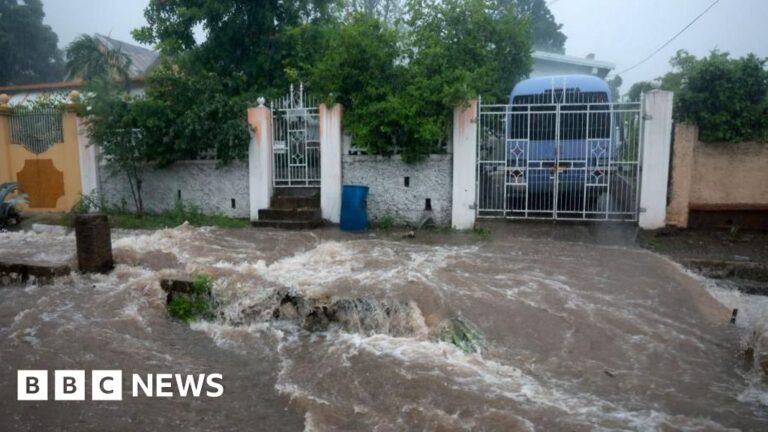- author, Nick Davis
- role, BBC News, Kingston
-
Hurricane Beryl pounded the southern coast of Jamaica on Wednesday night, leaving hundreds of thousands of homes in the country without power.
The Category 4 storm was one of the strongest to hit the country, dumping heavy rain for more than 12 hours and raising concerns about flash flooding.
An island-wide curfew was extended until 6 a.m. local time (11 a.m. GMT) on Thursday and the hurricane warning was lifted, replaced by a flash flood watch.
As the sun comes up and curfews are lifted, residents will be able to go outside and assess the extent of the damage.
Beryl has now weakened to a Category 3 storm and is heading toward the Cayman Islands and southern Mexico, according to the US National Hurricane Center (NHC).
Predicted path of Hurricane Beryl
But it left devastating damage across the Caribbean and killed at least seven people.
Here in the capital, Kingston, the winds were very strong but not the hurricane-force gusts that were expected, but the heavy rain over many hours is a real concern, especially in farmland where flooding has been reported.
“The situation is terrible. Everything has disappeared. We are inside our homes but we are scared,” one rural resident told Reuters.
“This is a disaster,” said Amoy Wellington, who lives in St. Elizabeth South Parish.
On Wednesday night I was able to get out for a short while to move my car away from the overhanging trees.
There was a full-length mirror next to the car, presumably blown off someone’s balcony, a reminder that in such strong winds, unexpected objects can suddenly become missiles.
Power company JPS said Thursday morning that 65% of its customers, or about 400,000 people, were without power.
The member of parliament for South West St Elizabeth said the hurricane had caused “the most devastating damage” to parts of the island.
Floyd Green posted on X that in his district, “a significant number of roofs are [have been] Roads are lost, houses destroyed, trees uprooted, lampposts toppled, and nearly all roads are impassable.”
Caribbean media reported that the UN has released $4 million (£3.1 million) from its emergency response fund to help Jamaica, Grenada and St Vincent and the Grenadines with their recovery efforts.
Prime Minister Andrew Holness took to his X account to thank “emergency personnel, essential services, security forces and good Samaritans who have helped others during this crisis.”
“This storm will pass and we will recover,” he said.
Beryl is currently hurtling towards the Cayman Islands, with the NHC warning that “high winds, dangerous storm surge and damaging waves are expected.”
The islands’ tourism minister, Kenneth Bryan, told the BBC that most people would be able to tolerate the winds, but flooding was also a major concern.
Hurricane Beryl has already caused devastation in Grenada, Saint Vincent and the Grenadines and northern Venezuela, with at least seven people known to have died.
Meteorologists were shocked by how quickly the storm developed, taking just 42 hours to go from a tropical depression to a major hurricane.
Additional reporting by Alex Smith and Tiffany Wertheimer

